Dare to Be a Daniel (33 page)
Read Dare to Be a Daniel Online
Authors: Tony Benn

My age allows me to recall what happened in Germany before the war, where a despairing people turned to Hitler, who blamed the Jews and the trade unionists for their problems. He told the people that he would give them full employment, and by God he did – he rearmed them, and we had a war as a result.
It is necessary to say plainly and clearly that peace without social justice is impossible. We cannot have a peaceful society or a peaceful world if the principles of social justice are secondary to the search for profit. A society that is built around people and not profit is what lies at the heart of the socialist idea.
In the debate to which I referred at the outset of my remarks, Keir Hardie concluded, ‘We are called upon at the beginning of the twentieth century to decide the question propounded in the Sermon on the Mount as to whether or not we will worship God or Mammon. The present day is a Mammon-worshipping age. Socialism proposes to dethrone the brutal god Mammon and to lift humanity into its place. [
Official Report
, 23 April 1901; vol. 92, c. 1179]
That is a very religious way of putting it, but it explains the idea that has moved people to do things. All real change comes
from
underneath. The idea of cooperation rather than competition appeals to most people in their own lives. Competition creates insecurity and anxiety, while cooperation is always dominant when people look after their disabled children or their old parents. I think that that idea is of value.
I want to leave time for what will be a full debate, so I shall conclude on the policies that may follow from the ideas that I have advanced. First, we must expand the public services and ensure that they are publicly funded. In the immediate post-war years, the idea of National Insurance was based on that of universal benefits. I do not believe that it is right for people to be means-tested before they are entitled to benefits for which they have paid, either through National Insurance contributions or taxation. That is especially true of the need to link pensions with earnings. I am proud to have been in the Cabinet that made that link and I am distressed that it was reversed, at a cost of about thirty pounds a week to pensioners. That provides a good example of what should be done.
We should have expanded public services for the provision of health care and education, which should be open, so as to allow every child access to the full range of knowledge in schools that are comprehensive in what they offer. Also, there should be access to the media, which does not usually cover the concerns of those who do not have wealth and power. I should add to that list the legal services, which are very expensive but absolutely necessary.
The second item on my list is the revitalisation of local government. I referred to the great Liberal achievements of the nineteenth century, and there are many examples of such achievements in the twentieth century. Local government should have the funding that it requires, the right to raise its own money – if it can persuade its electors to give it that money – and general
powers
that are not tied up by specific grants that local authorities administer but do not decide.
Thirdly, if we are genuinely interested in the idea of full employment, it is essential that we support manufacturing industry. For most of my life as a minister, I tried as best as I could – sometimes successfully, but generally not – to reverse de-industrialisation. In 1948, Britain launched 48 per cent of all the ships launched in the world. In 1970, we had the largest motorbike industry in the world. In 1974, we had the largest machine-tool industry and the largest car industry in Europe. That has all gone.
It is in the national interest to protect ourselves from invasion from abroad. We would resist anyone who tried to bomb our car factories, but if somebody buys and closes those factories, it is regarded as an inevitable consequence of globalisation. I do not think that that is a sustainable position. The same is true of privatisation. I hesitate to quote Harold Macmillan, but he said that privatisation was selling the family silver. That is not an example that would come immediately to mind for most families, but it was a vivid description of the sale of our natural assets.
We must have civil liberties. I refer not just to legal liberties and an end to discrimination, but to the acceptance of trade-union rights. It is amazing that we talk about a global economy, but that we do not legislate to implement the rights given to trade unions in the International Labour Organisation. I have introduced a Bill on the matter – the House may want to consider it – as such legislation is necessary.
We need a fairer tax system. I cannot understand why any government should ring-fence the rich and say, ‘Whatever we do, we will not ask you to pay more’, when people on benefits are continually being faced with demands to open the books and be
examined
, in an attempt to deal with benefit fraud. My hon. Friend the Member for North-East Derbyshire [Harold Barnes] may wish to raise the question of the Tobin tax, which would tax international transactions and could provide billions of pounds for international development.
It is often argued that no one has any power over multinationals, but I do not believe that. Multinational companies spend millions of pounds on trying to win popular support through advertising campaigns, because they know that it is necessary to retain the goodwill of host governments. I believe that it is necessary to treat multinationals as international agents and to negotiate with them as if they were countries.
We must have stronger environmental laws. Keir Hardie was a passionate environmentalist, who complained about the rain forests in the United States being cut down. He was also a great believer in animal rights. On one occasion, Hardie was followed home from the House of Commons by a journalist from the
Daily Mail
, who hoped to find out to whom he talked in the street – no doubt, in an attempt to uncover some scandal. The journalist said that Hardie patted all the horses that he saw in the street. Being a miner, Hardie appreciated the value of the pit pony.
We need to end the arms trade, which is far more serious than the drugs trade that receives so much attention. The arms trade allows arms manufacturers to arm both sides in a conflict. Then, when those arms are used, the world demands a ceasefire. I sometimes wonder whether the idea is to discover which arms work best so that more can be sold afterwards, as we saw in the case of the Exocet that sank HMS
Sheffield
during the Falklands War.
Finally, we should try to build the United Nations as an embryonic, democratic institution, in accordance with the aspirations
of
the Chartists, who wanted to establish democratic government in Britain. If we are to have a global system, it must be a worldwide system, but it must be based on democratic accountability. My conviction is that the UN is being bypassed by NATO, whereas the UN should have responsibility, through the General Assembly, for controlling multinationals, which cannot be disciplined in any other way. The World Trade Organisation and the IMF should also be accountable to the United Nations General Assembly. That would be true internationalism rather than globalisation.
Those are my convictions. I am a socialist and I became a socialist through experience. After fifty years in the House and many years as a minister, I realise the way in which power is exercised to shape our society. As I leave the House of Commons and approach a new political life at the end of this Parliament, I shall want to put those arguments to the electors as a non-candidate when the election comes, because I honestly believe that the ideas have much more support than the British establishment, any government or the House yet realises.
All progressive change has come from underneath, and it might be worth remembering that there is a different tradition from those ideas with which we are presented every day. If we remember that, we might make more progress in winning public support for what needs to be done.
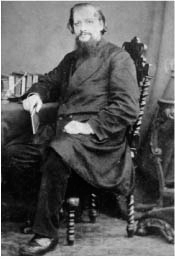
Great grandfather, the Rev. Julius Benn, minister of the Gravel Pit Chapel, Hackney, murdered by his son, William, during a bout of insanity
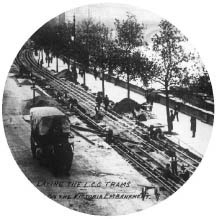
Laying the tracks for the LCC’s electric trams on Victoria Embankment.
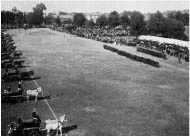
Grandfather John Benn, as Chairman of the LCC, reviews the London Fire Brigade, with its horse-drawn engines in 1904.
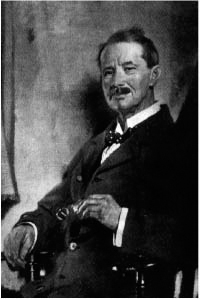
John Benn, 1904 (painted by Sir William Orpen).
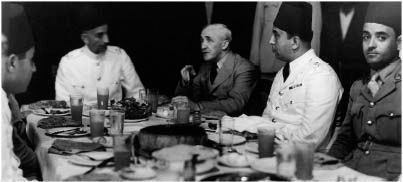
Father, then Secretary of State for Air, in Alexandria, 1946, during the negotiations for a revision of the 1936 Anglo-Egyptian Treaty.
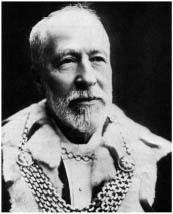
Great grandfather Peter Eadie as Provost of Paisley, 1905.
